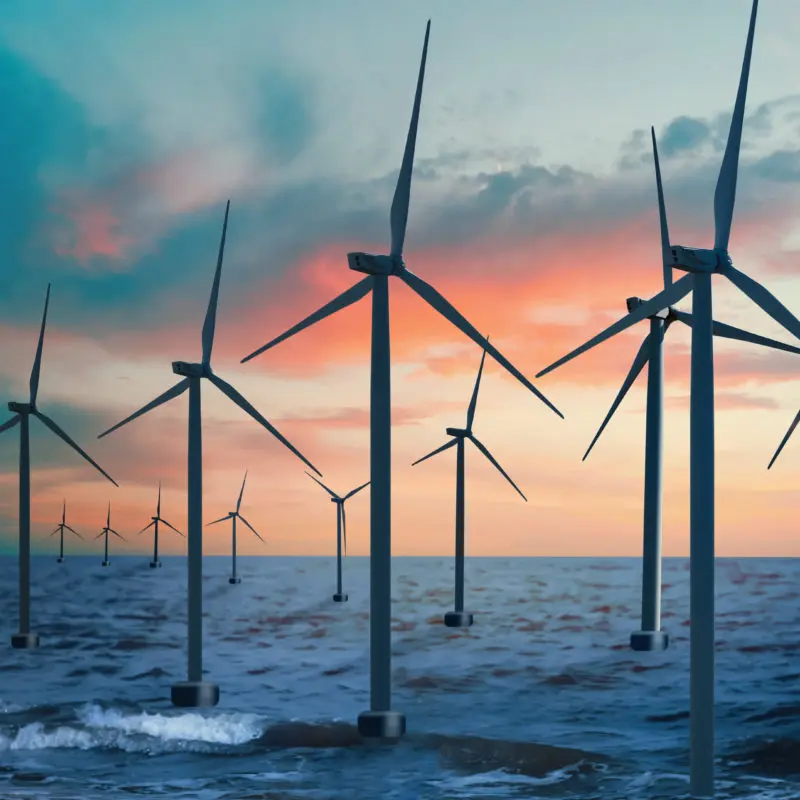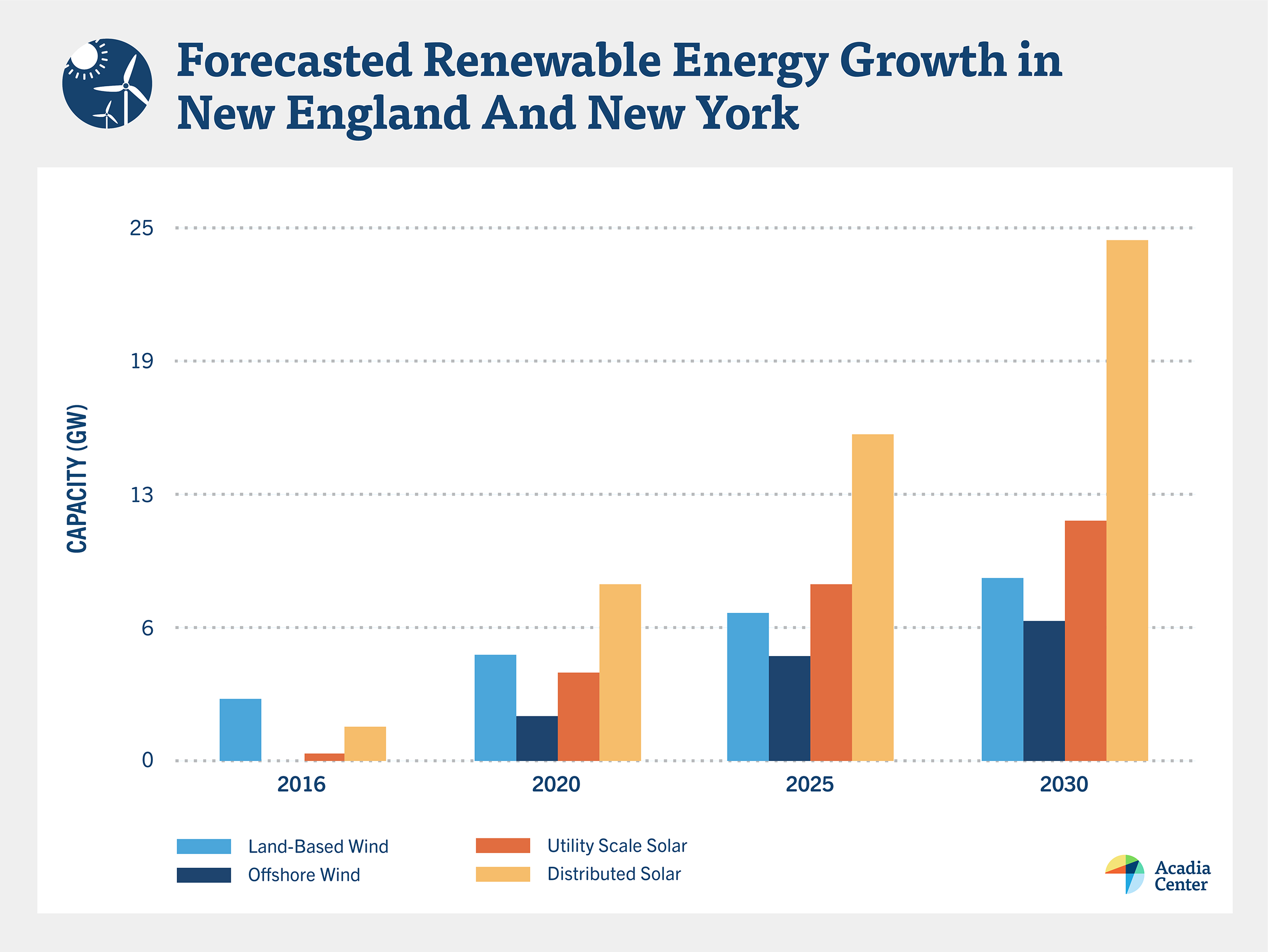Attaining the Northeast region’s climate goals requires continued shift in electricity generation away from fossil fuels like natural gas to low and no-carbon power generation. As the buildings and transportation sectors, which are currently the largest emissions sources, become increasingly powered by clean electricity, climate pollution in these two areas will fall. Acadia Center works to increase clean electricity by pressing for policies including renewable portfolio standards, solar incentive programs, and competitive procurements from offshore wind generators, as well as staying at the table to ensure that these policies are well-designed and achieve their goals. Acadia Center’s engagement in the electric power sector focuses on three main priorities:
- Advancing clean large-scale electricity generation;
- Advancing local, distributed clean energy; and
- Aligning the regional electricity system with clean energy and climate goals.
In advocating for the transformation of electric generation, Acadia Center promotes change that:
- Brings about rapid decarbonization of the grid and ends the region’s dangerous and costly dependence on natural gas, by removing barriers to greater clean energy deployment;
- Addresses equity and health disparities and ends the detrimental effects of fossil fuel infrastructure on frontline communities;
- Reshapes the regional electricity system to fully recognize the benefits of state climate and clean energy commitments; and
- Is supported by forward-looking analyses of decarbonization pathways, clean power scenarios, and policy advancement.
Advancing Clean Large-Scale Electricity Generation
Acadia Center advocates for Northeast states continuing to set and achieve clean energy goals through well-designed and implemented market-based policies such as renewable portfolio standards (RPS’s) and competitively procured large-scale renewable generation such as offshore wind. Given the region’s opportunity to reach significant levels of offshore wind, Acadia Center works to raise state commitments, continuously improve the procurement processes, and ensure that existing commitments are fulfilled. As these clean energy resources continue to expand, Acadia Center promotes regional solutions that will achieve the region’s offshore wind targets in the most rapid, cost-effective, and environmentally responsible way. In 2019, Northeast states more than doubled Acadia Center’s 2030 minimum OSW (off-shore wind) recommendations, and made commitments to 14,600MW by 2035.
Advancing Local, Distributed Clean Energy
Throughout the region, Acadia Center strives to increase opportunities for all distributed energy resources to play a role in the clean energy future. Acadia Center advocates for state policies that will grow our region’s reliance on local resources such as renewable energy storage and distributed generation like solar. Acadia Center plays a leading role in ensuring states look first to local energy resources that improve the reliability of the distribution grid and provide direct benefits to residents.
Solar power is one of the cleanest, most affordable sources of renewable, zero-carbon energy available and an essential tool for reaching state carbon reduction goals. Acadia Center has successfully preserved or improved state net metering programs, making solar more beneficial to customers. Expanding solar power needs to be balanced against the need to preserve and protect the region’s best farm and forest land. Through engagement in stakeholder processes, Acadia Center advances responsible siting policies that overcome deployment barriers and protect precious resources like farms and forests.
Aligning the Regional Electricity System with Clean Energy and Climate Goals
Regional electricity markets serving New England (ISO-NE) operate under policies and rules that are increasingly at odds with state climate goals and commitments to clean energy. Serious flaws in regional electricity market rules lead to shortsighted, expensive decisions that are costly for all consumers. The market rules give natural gas (better termed “fossil gas”) power plants a significant advantage over viable clean energy resources, delaying the retirement of fossil power plants and jeopardizing the region’s clean energy future. These biased rules are leading to continued investments in and support for fossil gas, disproportionately impacting people that live near the plants and suffer negative health impacts as a result.
For the Northeast to achieve its climate goals and capture the many benefits of clean energy resources, the rules and priorities that govern the regional electricity system must change. The conditions are ripe for transformation. Through analysis, public education, and coalition engagement, Acadia Center is driving efforts to press for needed reforms to realign the regional electricity system to support clean energy, environmental justice, and climate progress.
Acadia Center has long worked to raise awareness of the need to reform outdated and biased ISO-NE rules and financial incentives and to align the regional electricity system with climate goals and consumer benefits. This work includes advocating for the inclusion of energy efficiency as a resource into long-term forecasting. Energy efficiency is now an accepted part of ISO-NE’s long-range load forecast, which led to the suspension of over $400 million of unnecessary transmission projects. Acadia Center has created public engagement materials that highlight this issue, such as Incentives For Change, which shows how the current process selects higher-priced and dirtier solutions by ignoring clean energy technologies.
As a member of the New England Power Pool (NEPOOL), Acadia Center advocates within “insider” forums traditionally dominated by well-funded, entrenched interests at ISO and NEPOOL seeking a system that favors natural gas infrastructure that will burden the region for decades. Acadia Center uses its analytical capacity and fifteen years of experience to engage with a range of coalition partners and to steer these highly technical discussions. This engagement informs stakeholders’ regional and state advocacy on clean energy goals, and also informs Acadia Center’s advocacy for meaningful outcomes at the Federal Energy Regulatory Commission (FERC), ISO-NE, and NEPOOL.





















